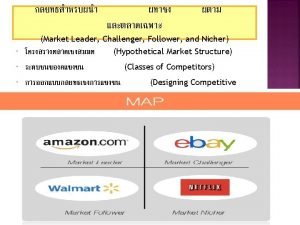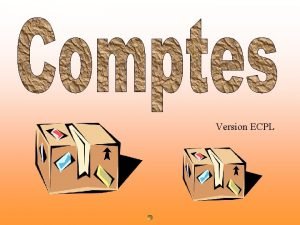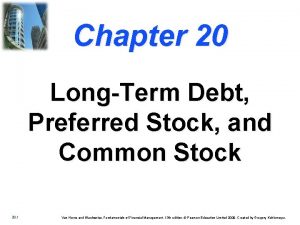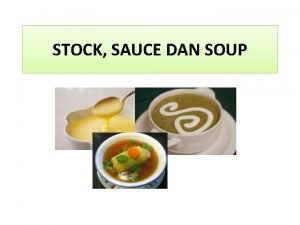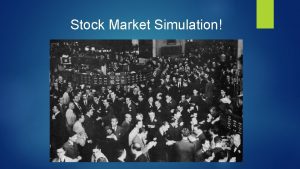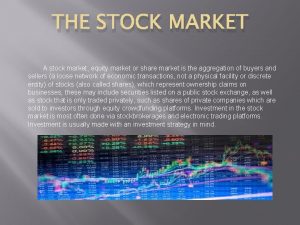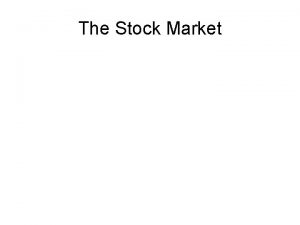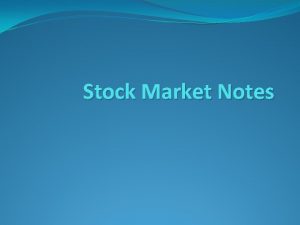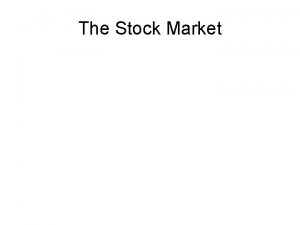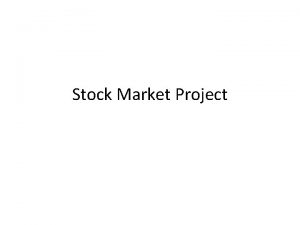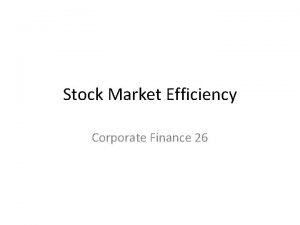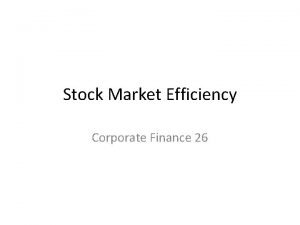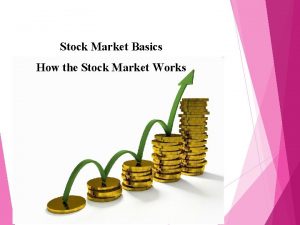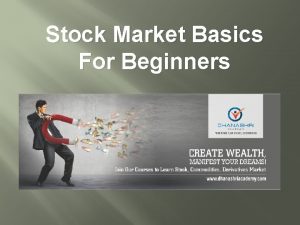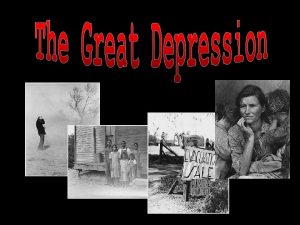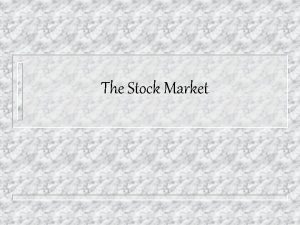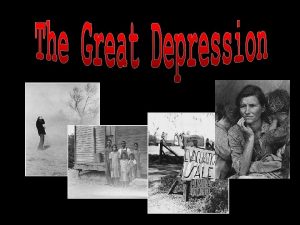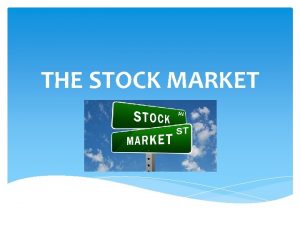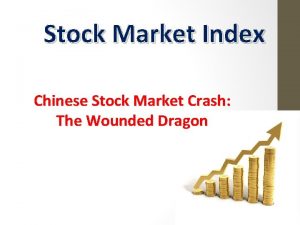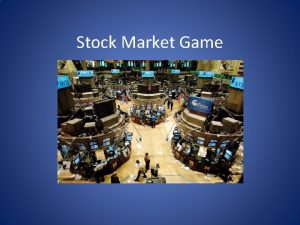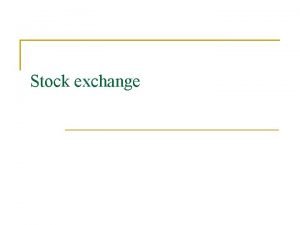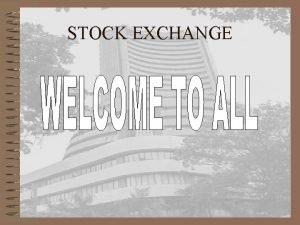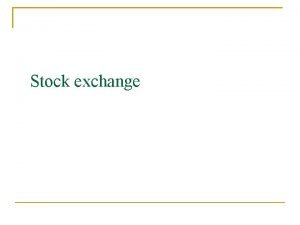Stock Market Ch 11 O The Stock Market






































- Slides: 38

Stock Market Ch. 11 O The Stock Market - What do you own if you own stock? (shares) ownership in a company - What is the reason a company sells shares of stock? Provide $ for expansion or modernizing

Stock Market Public Company vs. Private Company O Public – company that offers its stock for sale. Partially owned by investors who buy stock through a stock exchange O Private – owned by a person, family, or small group of investors who do not offer stock to the general public.

Stock Market Where does stock come from? * Investment bankers and company agree on a stock offering (IPO) * Investment bankers buy shares at a set price – this is the primary market * Investment bankers sell stock to the public to make a profit – this is the secondary market.

Stock Market Types of Stock *Common stock - ownership entitles owner a vote in Board of Directors matters. - Does not guarantee a dividend - More volatile – price changes more *Preferred Stock – No voting rights - Dividend is guaranteed if there is one offered - Not as volatile as common stock - If company fails, you get repaid 1 st

Stock Market Stock Exchanges Market for buying and selling stock *NYSE (major exchange) - largest most established companies - blue chip stocks - sound finances and proven record - 1 to 3 letter in stock symbol

Stock Market Stock Exchanges *AMEX – Lesser established companies - As many as 5 letters in ticker symbol *NASDAQ - Newer, smaller companies in technology - As many as 5 letters in ticker symbol *Internet


Stock Table

Stock Market Mutual Funds - Funds consist of many different stocks or bonds (could be 100 or more) - Managed by professionals so you don’t have to - Manager pools $ of investors - Easy way to diversify (not putting all eggs in one basket) (less risky than stock) - Ticker symbols usually 5 letters ending in “X”

Stock Market Bonds - Like an I. O. U. for loan you have made to an institution - In return, the issuer promises to pay you interest + repay the face value when the bond matures - Corporate – backed by corporation - Municipal – issued by state and local govt. - Treasuries – Bonds & Bills – backed by U. S. Govt.

Stock Market Dividends Corporate profits paid to shareholders. - Paid every quarter or once a year - Good indicator of wealth (higher profit = higher dividend)

Stock Market Gains & Losses - Capital Gain - sell stock for more than you bought it. - Capital Loss - sell stock for less than you bought it. (gain + dividends = total return) Day Trader ?

Stock Market O Stocksplits - happens when value of stock gets too high. - each share splits into more than one - why do this?

Stock Market O Buy on Margin - buy stock on credit - can only buy certain percentage. Never more than 50 %. - 100 shares @ $100 / share = $10, 000 - you only have $5, 000 - borrow other $5, 000

Stock Market O Short sell – Borrow Stock from Brokerage firm (unsold inventory or from another investor). Must return it in the future. - Borrow - hope market goes down – Short cover (buy back) at lower price - pocket difference. - sell 200 @ $50 / share = $10, 000 - buy 200 @ $40 / share = $8, 000

Stock Market Risky Business High Risk = High Reward - Stock Broker - person bringing together buyers and sellers of stock. - Brokerage firm - business specializing in trading stocks. - They will charge broker’s fees

Stock Market O Measurements - Bull Market - Bear Market - Dow Jones Industrial Avg. (The Dow) 30 large companies in various industry. Represents market as a whole.

Stock Market - S & P 500 - (standard & Poors) - more broad picture of market. - overall performance of stock market.

Stock Market O Stock market crash - 1929 (Bull Market) - Wealth in hands of few - interest rates low - people going into debt - speculation popular

Stock Market - high demand for stock - prices higher than real value - Oct 29, 1929 - Black Tuesday - Americans cautious until 80’s & 90’s - 47 % households in market in 90’s

Stock Market Places to research freestockcharts. com nyse. com CBS marketwatch nasdaq. com MSN Moneycentral Yahoo Finance Morningstar. com money. cnn. com Pathtoinvesting. org Investinginbonds. com









Money & Finance Ch. 10 - Ch. 11 O Money -Currency - coins & bills greenbacks, benjamins, cabbage, c-note -cattle, salt, stones, rice, wheat,

Money & Finance (10. 1) O How do you define money? - Money (medium of exchange) something used to determine value - Barter Takes a lot of effort - need double coincidence of wants.

Money & Finance (10. 1) - Money (unit of account) - compare value of goods and services - in U. S. value measured in dollars and cents - gives ability to determine value - other units of account?

Money & Finance - Money (Store of Value) - Something that holds its value - Money will hold value for future. - but, hard to predict future value.

Money & Finance 1. 6 characteristics of money Durability 2. Portability 3. Divisibility - Only pay what you have to. Different nominations O

Money & Finance 4. Uniformity - 4 quarters = $1 no dispute on value of money 5. Limited Supply 6. Acceptability

Money & Finance O What gives money its value? (types of money) - Commodity Money - objects with value in themselves and are used as money

Money & Finance - Representative Money - something that can be exchanged for money - I. O. U - Silver Certificates - Gold Standard

Money & Finance - Fiat Money - something that has value because govt. says it does. - Money is ordered to be acceptable for payment of debts
 Market leader follower challenger nicher
Market leader follower challenger nicher Market segmentation objectives
Market segmentation objectives Characteristics of common stock
Characteristics of common stock Stock initial
Stock initial Features of preferred stock
Features of preferred stock Teknik pembuatan white stock sesuai dengan standar
Teknik pembuatan white stock sesuai dengan standar Thế nào là hệ số cao nhất
Thế nào là hệ số cao nhất Diễn thế sinh thái là
Diễn thế sinh thái là Vẽ hình chiếu vuông góc của vật thể sau
Vẽ hình chiếu vuông góc của vật thể sau Làm thế nào để 102-1=99
Làm thế nào để 102-1=99 Lời thề hippocrates
Lời thề hippocrates Glasgow thang điểm
Glasgow thang điểm đại từ thay thế
đại từ thay thế Quá trình desamine hóa có thể tạo ra
Quá trình desamine hóa có thể tạo ra Cong thức tính động năng
Cong thức tính động năng Sự nuôi và dạy con của hươu
Sự nuôi và dạy con của hươu Thế nào là mạng điện lắp đặt kiểu nổi
Thế nào là mạng điện lắp đặt kiểu nổi Dạng đột biến một nhiễm là
Dạng đột biến một nhiễm là Thế nào là sự mỏi cơ
Thế nào là sự mỏi cơ Bổ thể
Bổ thể Vẽ hình chiếu đứng bằng cạnh của vật thể
Vẽ hình chiếu đứng bằng cạnh của vật thể Phản ứng thế ankan
Phản ứng thế ankan Thiếu nhi thế giới liên hoan
Thiếu nhi thế giới liên hoan điện thế nghỉ
điện thế nghỉ Hát lên người ơi
Hát lên người ơi Một số thể thơ truyền thống
Một số thể thơ truyền thống Trời xanh đây là của chúng ta thể thơ
Trời xanh đây là của chúng ta thể thơ Bảng số nguyên tố lớn hơn 1000
Bảng số nguyên tố lớn hơn 1000 đặc điểm cơ thể của người tối cổ
đặc điểm cơ thể của người tối cổ Tỉ lệ cơ thể trẻ em
Tỉ lệ cơ thể trẻ em Vẽ hình chiếu vuông góc của vật thể sau
Vẽ hình chiếu vuông góc của vật thể sau Các châu lục và đại dương trên thế giới
Các châu lục và đại dương trên thế giới ưu thế lai là gì
ưu thế lai là gì Hệ hô hấp
Hệ hô hấp Môn thể thao bắt đầu bằng chữ đua
Môn thể thao bắt đầu bằng chữ đua Tư thế ngồi viết
Tư thế ngồi viết Hát kết hợp bộ gõ cơ thể
Hát kết hợp bộ gõ cơ thể Cái miệng xinh xinh thế chỉ nói điều hay thôi
Cái miệng xinh xinh thế chỉ nói điều hay thôi
